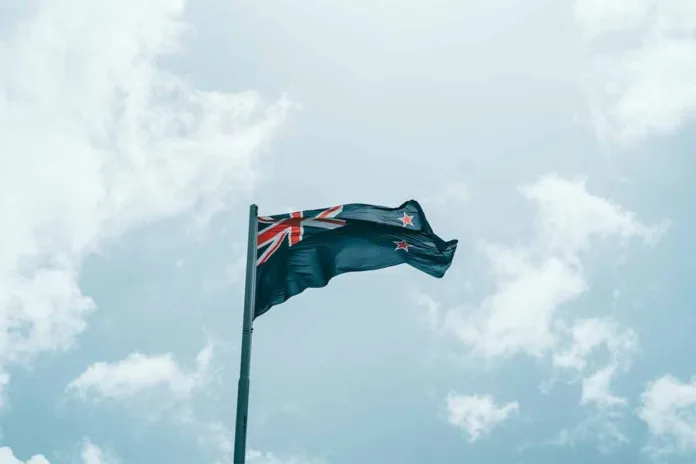New Zealand’s economy has slipped into a recession due to the combined effects of aggressive interest rate hikes and storm damage, posing a fresh challenge for Prime Minister Chris Hipkin’s government just four months ahead of the general election.
Stats NZ recently reported that during the first quarter, the economy experienced a decline of 0.1%. This follows a notable contraction of 7% in the previous quarter. This result was less favourable than the Treasury and central bank’s predictions, which both predicted a 0.3 percent growth in the March quarter.
The Reserve Bank of New Zealand, having taken the lead globally in raising rates to counter the post-pandemic inflation surge, increased the official cash rate 12 times since October 2021.
This recession marks the end of the RBNZ’s hawkish stance as households, already grappling with high prices, experience a surge in mortgage repayments. It may also hasten a shift in New Zealand’s monetary policy, as other central banks worldwide focus on achieving a soft economic landing rather than sliding into recession.
While the US Federal Reserve has recently paused its series of rate hikes, it still predicts borrowing costs will ultimately surpass previous expectations.
Chief economist at Kiwibank, Jarrod Kerr, criticized the RBNZ, stating that they had gone “too hard.” He described this recession as an intentional creation by the RBNZ. Households have curtailed spending due to rising prices, leading to decreased business tax and GST returns. Additionally, falling house prices have eroded confidence. Kerr warned that the full impact of the RBNZ’s tightening measures has yet to be felt, as many households have yet to face higher interest rates on their mortgages.
The RBNZ had previously indicated that a recession might be the necessary consequence of bringing inflation back within its 1-3 percent target range. The central bank has taken a significant step by deciding to raise the cash rate from 0.25 percent to 5.5 percent. This move solidifies its position as one of the more proactive central banks among developed nations.
Kerr suggested that New Zealand’s economy has taken a downturn sooner and faster than expected and predicted further contraction throughout the remainder of this year and possibly into 2024. Although there is a possibility of a minor recovery in the June quarter, he foretold that the latter half of the year would be more challenging compared to the initial months.
Grant Robertson, the minister of finance, downplayed the information, calling it “not a surprise.” He also didn’t make any public indications that the government and the central bank were developing a disagreement.
Robertson asserted that the New Zealand economy is well-equipped to handle the upcoming challenges, citing increased migration, a rebound in tourism, and stronger export forecasts.
The confirmation of a recession, however, is a setback for the in power Labour Party and political fodder for the rival National Party, which intends to focus its election-year campaigning on the government’s economic management.
The opposition’s spokesperson on finance, Nicola Willis, warned that “red lights are flashing” and emphasised that the New Zealand economy is in worse shape than those of nations like Australia, Canada, and the US.
According to Statistics NZ, the downturn can be attributed, in part, to the impact of Cyclones Gabrielle and Hale earlier this year, as well as flooding on the North Island’s east coast and in Auckland. The farming and transport sectors were hit hard, causing extensive damage to infrastructure. The recent teachers’ strike also contributed to the decline.
With business services, engineering, consulting, education and training, service industries, manufacturing, agriculture, forestry, and fishing being the most impacted, over half of all sectors experienced a decline. However, construction saw a 1.8 percent increase, while the telecoms, mining, and finance sectors showed improvement.
This recession marks New Zealand’s first since 2020 when the economy was severely impacted by COVID-19 lockdowns and border closures.
When compared, the OECD saw growth of 0.4% in 2023’s first quarter.
Residential property prices are falling by 11.2 percent yearly during the recession, which coincides with high interest rates in New Zealand. The cost of living is also increasing, with inflation currently at 6.7 percent.
Food prices have risen by 12 percent compared to a year ago, and the government is facing challenges in convincing voters that they are focused on addressing everyday concerns, a priority that Prime Minister Hipkins has emphasized since taking office in January.
Although initially experiencing a boost in the polls, Prime Minister Hipkins has faced a series of setbacks. One minister defected to the Maori Party in the last three months, while another resigned after sharing Cabinet information with donors.
Just last week, senior minister Michael Wood was suspended from his transport portfolio for failing to sell a NZD 13,000 parcel of Auckland Airport shares, despite being reminded 12 times over the course of two years.
Meanwhile, the leader of the opposition, Christopher Luxon, struggles to resonate with voters and lags behind in the preferred prime minister rankings.




